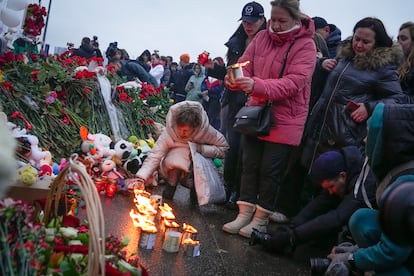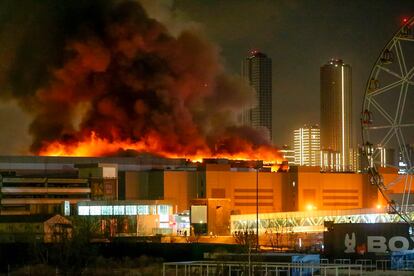The West fears Putin will use Moscow attack to increase domestic repression and aggression in Ukraine
The attack weakens the image of the head of the Kremlin as the guarantor of security for the Russian population. Washington sees no reason to doubt ISIS involvement

The U.S. had warned Russia this month of the risk of a terrorist attack in Moscow, specifically from ISIS-K, the Afghanistan-based branch of the Islamic State. In the climate of distrust and antagonism marking relations between Washington and Moscow over the war in Ukraine, the warnings were dismissed by the Russian president, Vladimir Putin, who regarded them as a provocation. These warnings failed to prevent the worst attack that Russia has endured in two decades, a massacre that has claimed more than 130 lives. This tragedy that could have been avoided comes as a major blow to Putin, who has striven to portray himself as a guarantor of stability and to cultivate his security structure. Against that background, the Kremlin has hinted at an alleged Ukrainian involvement. However, Washington stresses that it sees no reason to doubt ISIS’s claim of responsibility. Diplomatic and intelligence sources agree with this assessment, fearing that the Kremlin will use the alleged Kyiv link to ramp up its escalation in the invaded country. They also fear that it could be used to conduct another round of recruitments and impose a harsher security regime in Russia.
The Kremlin — like the media and people in its orbit — has refrained from mentioning ISIS and its authorship of the Moscow attack. It also has avoided commenting on the intelligence provided by Washington or the possible security and surveillance flaws that failed to prevent the attack. Instead, Putin has alleged that Ukraine is somehow involved in the massacre, without providing any information or evidence, something Kyiv strongly denies. The authorities have arrested 11 people in their flight in the Bryansk region (bordering Belarus and Ukraine) for the massacre, four of them are accused of being the masterminds of the attack. Russian authorities have claimed that they were all foreign nationals, mostly from Tajikistan, and that they were fleeing “to Ukraine” and had “relevant contacts” there. The U.S., the European Union and NATO have strongly condemned the terrorist attack.

The head of the Kremlin was somewhat slow to make an appearance in the aftermath of the tragedy. And when he did, at lunchtime on Saturday, it was very brief. As Russia digested the horrific tragedy and the West warily watched ISIS’s ability to rebuild itself, the Russian leader swore vengeance against the culprits. Putin has forged an image as a tough leader and guarantor of security, who managed to crush Chechen and Dagestan separatism and thwart the wave of terrorist attacks at the turn of the century. However, Friday’s attack, which came merely days after he was re-crowned as undisputed leader following an uncontested vote, throws up many questions about the workings of Russia’s security system.
As most forces are focused on the war against Ukraine, which has now entered its third year, some voices indicate that the Kremlin may have neglected other threats. Moscow has shifted the spotlight of its surveillance since the invasion to Kyiv, and is devoting significant efforts to cutting out dissent and any signs of opposition to the war.
Islamist terrorism is no stranger to Russia, where several large-scale attacks have been recorded over the past decade. Indeed, the Federal Security Service (FSB) reported earlier this March that it had prevented an attack on a Moscow synagogue by what it called an Afghan branch of the Islamic State, according to Interfax.
Russian specialists remained cautious about Putin’s next steps. For now, the reinstatement of the death penalty — which has been frozen by a moratorium since 2001 — has been restored to the parliamentary agenda, and a tougher crackdown not only on domestic repression but also on policies against migrants may be on the horizon.

The West has isolated Putin since he initiated the full-scale invasion on February 24, 2022. Yet at the same time it maintains open channels with Moscow, in order to exchange information, among other things. Likewise, the Kremlin has chosen to isolate itself — and its population — from what it believes to be a “collective West” and the values it represents, contrary to those it seeks for Russia.
“The Embassy is monitoring reports that extremists have imminent plans to target large gatherings in Moscow, to include concerts, and U.S. citizens should be advised to avoid large gatherings over the next 48 hours.” This warning was issued publicly by the U.S. Embassy in Moscow on March 7, and urged U.S. citizens to avoid crowds, to follow local media updates, and to be alert to their surroundings at all times. Six other Western diplomatic missions, including that of the United Kingdom, had also alerted their citizens of the “imminent” threat.
In addition to that public warning, U.S. intelligence privately warned Russian authorities of the danger of a terrorist attack. A spokeswoman for the National Security Council, Adrienne Watson, has confirmed that Washington was in possession of information earlier this month about a planned terrorist attack in Moscow that could be targeting large gatherings, including concerts. “The U.S. government also shared this information with Russian authorities in accordance with its longstanding ‘duty to warn’ policy,” said Watson.
Ignoring the warnings
On Tuesday, at a meeting with the FSB board of directors, Putin dismissed Western warnings of a possible terrorist attack. “All this seems like outright blackmail with the intention of destabilizing and intimidating our society,” he said, according to a transcript of his speech published by the Kremlin. At that meeting, the Russian leader argued that the West had once taken advantage of “various types of radical cross-border terrorist groups, including through encouraging their aggression against Russia.” Putin also hinted that Kyiv has switched to using “terrorist methods.”
Although U.S. intelligence maintains that the warning was specific, it remains unknown to what extent it was concrete enough to prevent the attack. The antagonism between the United States and Russia over the war in Ukraine has created mistrust in the bilateral relationship between the two countries, even though some channels of communication remain open.
Under this “duty to warn” policy, the U.S. repeatedly issues warnings, both publicly and through diplomatic channels, when its intelligence services hold specific information about the risk of attacks. Washington warned Iran of the possibility of an attack at the Kerman cemetery as thousands of people were paying tribute to General Qasem Soleimani, who was shot down by the U.S. in 2020 in a drone strike.
Sign up for our weekly newsletter to get more English-language news coverage from EL PAÍS USA Edition
Tu suscripción se está usando en otro dispositivo
¿Quieres añadir otro usuario a tu suscripción?
Si continúas leyendo en este dispositivo, no se podrá leer en el otro.
FlechaTu suscripción se está usando en otro dispositivo y solo puedes acceder a EL PAÍS desde un dispositivo a la vez.
Si quieres compartir tu cuenta, cambia tu suscripción a la modalidad Premium, así podrás añadir otro usuario. Cada uno accederá con su propia cuenta de email, lo que os permitirá personalizar vuestra experiencia en EL PAÍS.
¿Tienes una suscripción de empresa? Accede aquí para contratar más cuentas.
En el caso de no saber quién está usando tu cuenta, te recomendamos cambiar tu contraseña aquí.
Si decides continuar compartiendo tu cuenta, este mensaje se mostrará en tu dispositivo y en el de la otra persona que está usando tu cuenta de forma indefinida, afectando a tu experiencia de lectura. Puedes consultar aquí los términos y condiciones de la suscripción digital.








































